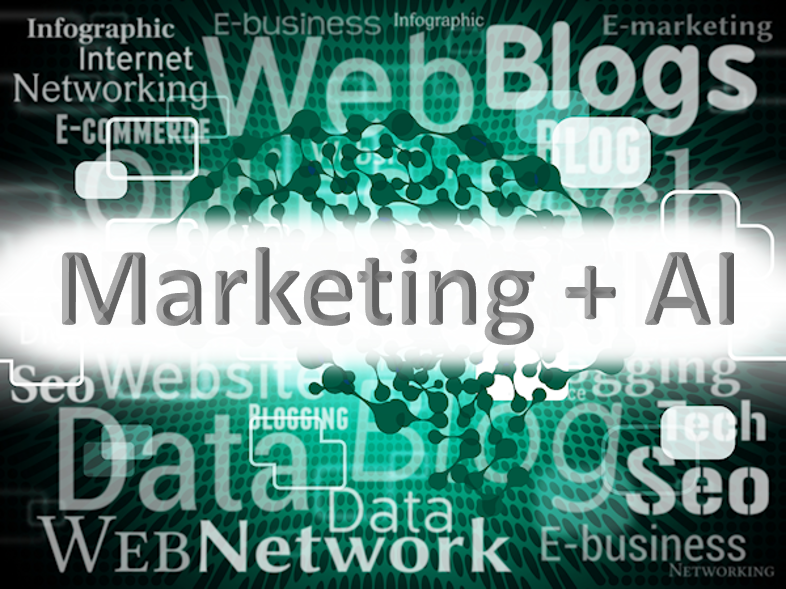Anyone who surfs the web on a regular basis knows they will start seeing advertisements for products for which they’ve shown an interest. Humans aren’t serving up those ads; rather, some sort of cognitive technology is being used. Cognitive technologies fall under the umbrella term “artificial intelligence” (AI). There is hardly an area of human activity that isn’t impacted in some way by cognitive technologies. Marketing is no exception. Ömer Artun (@omerartun), Chief Science Officer at Acquia, asserts, “Marketing is one industry where applying machine learning techniques to human intuition go hand-in-hand.”[1] Futurist Cathy Hackl (@CathyHackl) adds, “Artificial intelligence is top of mind for many in the marketing and communications world. … Many brands use algorithms to recommend personalized content, show personalized ads, as well as power customer service chatbots.”[2] Are cognitive technologies in marketing a big deal? A 2018, Juniper Research study predicted machine-learning algorithms would generate some $42 billion in annual ad spend by 2021.”[3] That prediction will likely be tempered by the pandemic; however, the trend is clear. Cognitive technologies and marketing will continue to be fellow travelling companions. Kazu Takiguchi, founder and CEO of ad creative platform ReFUEL4, insists, “The biggest disruption to marketing as we know it comes from machine learning AI applications, which can learn and improve over time independently after being taught with massive datasets of information.”[4]
The importance of cognitive technologies in marketing
Takiguchi asserts, “The main lesson to be learned from machine learning AI is the importance of being relevant and assessing trends in real-time. … Traditionally, a common pitfall for human marketing teams has been building creative campaigns around their clients’ products and services, rather than actually working out what content is resonating most with their target audiences at that time and handcrafting campaigns around it. Even today, in a world when consumers are constantly leaving digital clues about their behavior online using search engines or social media, marketers still use outdated techniques to gain insights such as focus groups and surveys. To top it off, once information has been gathered and processed, creative campaigns can take months to actually come to fruition, by which point they risk having become irrelevant, or old news.” Brian Solis (@briansolis), a Global Innovation Evangelist at Salesforce, states this simple truth: “There is no longer a delineation between digital and traditional customers.”[5]
“As marketers, Artun notes, “if we use machine learning on all the information we collect on our customers through their interactions with our brands, we can begin to develop loyalty programs, manage and understand the customer life cycle, market in real time, create highly personalized and relevant communications, acquire new customers and retain valuable customers for longer periods of time.”[6] The staff at Sitecore suggests four ways AI can help marketers.[7] They are:
- Increase ROI from content investments: With automated personalization and segmentation, increase the ROI on your content investments by always displaying the most relevant content to your customers.
- Increase productivity of your marketing team: Time spent away from defining personalization rules and customer segments can be used to create more effective content.
- Gain deeper insights into customer behavior: AI can assist in analyzing visitor interactions with every piece of content, helping you further refine your content creation.
- Deliver real-time personalization at scale: Make adjustments without worrying about updating segmentation and personalization rules as your business grows.
The Sitecore staff concludes, “AI brings the power of automation; it adds speed and precision where humans would typically require more time and would be able to make only educated guesses.”
Marketing and cognitive technologies
Jes Scholz (@jes_scholz), an International Digital Director at Ringier, insists, “Marketers aren’t fully leveraging artificial intelligence because of four main reasons.”[8] Those reasons are:
Reason 1: Lack of Technical Skills. “Although many marketers feel they lack the technical skills to adopt AI,” Scholz writes, “this need not be the case. The reality is, you already know everything you need to get started. There is a difference between machine learning research, which is all about building better algorithms and is the prerogative of data scientists, and applied machine learning, which is using algorithms to solve business issues, which is what marketers need to do. … You may not fully understand the science behind how a microwave works. But that doesn’t stop you from using it to cook.”
Reason 2: Fear of our Jobs. Scholz explains, “Some teams don’t want to begin AI initiatives as they fear it will cause the next industrial revolution and they will be out of a job — this naturally causes a lot of resistance. Unless you plan to retire in the next 5 years, artificial intelligence will significantly impact your career in marketing. But this doesn’t mean you will be replaced by a marketing robot.” The Sitecore staff notes, “What AI doesn’t do is empathize with your audience’s evolving emotional needs. Brands need to show empathy. AI allows marketers to skip the mundane tasks so they have the freedom to do what AI can’t do: be human. Adding that human element to digital marketing has taken on a whole new level of importance: for example, in understanding and engaging appropriately to popular culture, political sensitivities, public celebrations, and even social unrest.”
Reason 3: Investment of Resources & Budget. According to Scholz, “Executives are often concerned about the implementation efforts and costs for AI applications. So the best place to start is not by asking for more budget and resources, but by asking yourself are you fully leveraging what you are already paying for? … You can use these existing technologies as low investment proof of concept. So by the time you are asking for additional resources and budgets, your executives are already fully onboard.” Business leaders are persuaded by return on investment and pilot projects can show how significant ROI can be.
Reason 4: Quality of Data Sources. We’re all familiar with the term “garbage in, garbage out.” Scholz explains, “The very best AI tools and talent in the world will not deliver results if you are missing the most critical component for machine learning — high-quality data to inform the learning algorithm.”
Concluding thoughts
Mike Rowan (@mike_rowan), Founder & President of KPItarget, notes a number of ways “artificial intelligence is impacting marketing.”[9] They include: Targeting and evolving the right audiences; optimizing ad spend and management; leveraging image recognition; creating actual ads; and, using data points in programmatic advertising. He concludes, “These are only a few examples of how AI has evolved/improved the way that we advertise online, and it will obviously continue to innovate how we market. However, the impact to the marketing and advertising industry has been dramatic, and will accelerate as data becomes more robust, and additional mediums open up. Marketing and advertising combined with AI should continue to be a positive development, not just from a cost savings/conversion boosting perspective, but also from providing personalization and relevancy to the consumer.” Hackl adds, “It’s time for brands and businesses to better understand the broader trends that are on the horizon, so they are prepared for the future of marketing to come.”
Footnotes
[1] Ömer Artun, “How Will AI and Machine Learning Transform Marketing?” Acquia Blog, 12 May 2020.
[2] Cathy Hackl, “3 New Ways Artificial Intelligence Is Powering The Future Of Marketing,” Forbes, 28 June 2020.
[3] Rémi Lemonnier, “Who Will Survive The Machine-Learning Revolution?” AdExchanger, 19 April 2018.
[4] Kazu Takiguchi, “What Human Teams Can Learn From Machine Learning Marketing Algorithms,” AdWeek, 19 April 2018.
[5] Brian Solis, “Marketing In The Age Of Machine Learning,” Forbes, 8 November 2018.
[6] Ömer Artun, “How Machine Learning Is Transforming the Way Marketers Engage With Customers,” CMS Wire, 2 April 2019.
[7] Sitecore, “Marketers Need AI, and AI Needs Marketers,” MarketingProfs, 30 April 2020.
[8] Jes Scholz, “An Introduction to Artificial Intelligence in Marketing,” Search Engine Journal, 29 April 2020.
[9] Mike Rowan, “The Impact of Artificial Intelligence in Advertising,” Customer Think, 18 October 2019.





